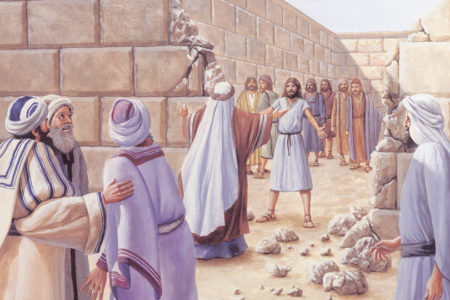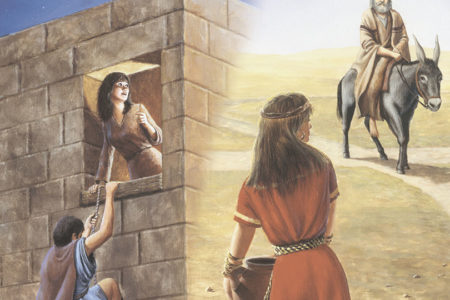Israel’s Impending Judgment
Hosea 5:1-15
Batsell B. Baxter tells of a huge painting hanging in the Supreme Court Building of Switzerland. In the foreground are the litigants who have come to the court seeking justice. Above them are seated the Swiss judges, robed in black. By what criteria will they pronounce judgment? The artist’s answer is simple: There stands Justice (usually depicted as blindfolded, with her sword held vertically) with her eyes opened wide and her sword pointing downward to an open book on which is written “The Word of God.”
The standard of judgment in this painting was also God’s standard when judged Israel in the days of the prophet Hosea. Israel was guilty of breaking the Mosaic Law found in God’s Word. Hosea chapter 5 expands the basic themes of God’s indictment against Israel.
People Accused
Though all of Israel was guilty, God blamed the nation’s leadership for ensnaring the people in sin. Hosea cried out, “Hear ye this, O priests; and hearken, ye house of Israel; and give ear, O house of the king; for judgment is toward you, because ye have been a snare on Mizpah, and a net spread upon Tabor” (v. 1).
Judgment would befall the priests, the general public, and the political leaders alike. But God considered the priests and political leaders to be the greater transgressors. By failing to teach the people God’s law, the priests were guilty of ensnaring the nation in sin. And the leadership, weakened by self-indulgent sins, was unable to provide guidance and direction.
Ironically, those who were to teach about judgment (priests) and to execute justice (princes) were now the subjects of judgment.
There were three charges leveled against the leaders of Israel. First, they were a “snare on Mizpah” (v. 1). Second, they were a “net spread upon Tabor” (v. 1). Israel had been snared, or trapped, like an animal and netted, or entangled, like a bird into heathen worship at cultic sites dedicated to the Canaanite deity Baal. The word Mizpah means “watchtower.” There were at least five places throughout the land called Mizpah. The two most famous were Mizpah in Gilead, east of the Jordan, where Jacob and Laban made a covenant before God (Gen. 31:45–55) and Mizpah west of the Jordan that was a border town in Benjamin between Judah and Israel. Mount Tabor is located in northern Israel, southwest of the Sea of Galilee. Mizpah in the south and Mount Tabor in the north were high places in the land and symbolized the heathen worship being practiced by Israel in every area of the country.
Instead of safeguarding the people of Israel, the priests and princes had seduced them by entrapping and entangling them in sin throughout the land—north, south, east, and west.
Third, God said these “revolters are gone deeply into slaughter, though I have been a rebuker of them all” (v. 2). Those sacrificing to Baal had become so thoroughly involved in slaying and sacrificing to idols that they brought destructive consequences on the common people of the land. Idolatry warranted God’s rebuke (chastening) of all Israel. Some teach that the word rebuke refers to God pouring out His wrath in a punishment just short of their annihilation as a people. Others believe it means severe punishment tempered by God’s love and mercy with a view to correct their idolatry. Whenever God chastened Israel, it was with these two objectives in mind: to punish them for sin and to bring them to repentance.
Israel’s sin was not hidden from God. He says, “I know Ephraim, and Israel is not hidden from me; for now, O Ephraim, thou committest harlotry, and Israel is defiled” (v. 3). No matter how hard a person or a nation tries to conceal its sin, God sees it and can reveal it. Moses told Israel, “be sure your sin will find you out” (Num. 32:23). Ephraim was the most powerful tribe in Israel. It was Ephraim who led and influenced the other nine tribes of Israel to participate so entirely in the sin that defiled her.
But nothing was hidden from the eye of the Almighty, and Israel’s sin was like an open sore in His sight. Her idolatrous worship centers adorned every high place in Israel, and the nation indulged in pagan worship that was accented by sexual immorality that God called harlotry. The nation had reached a point of no return; judgment from God was certain.
Hosea said, “They will not frame [direct] their doings to turn unto their God; for the spirit of harlotry is in the midst of them, and they have not known the LORD” (v. 4). In other words, their evil doings prevented them from turning to God in repentance. Therefore, Israel was locked into judgment, with no place to turn to escape the impending punishment. The “spirit of harlotry” had enslaved them, making them incapable of reversing their course of action. Here was a nation privileged above all others in the knowledge of God. God had revealed Himself to Israel, made a covenant with her, and given her the Law. Yet despite all this blessing, Israel had ignored God, causing her to become ignorant of the Lord’s ways and His desire for repentance.
Punishment Announced
The result of sin would be that “the pride of Israel doth testify to his face; therefore shall Israel and Ephraim fall in their iniquity; Judah also shall fall with them” (v. 5). The phrase pride of Israel can be interpreted two ways. The first is that God, who is the pride of Israel, would withdraw Himself from the sinful nation that ignored Him and would testify, or bear witness, against it through judgment. The second is that Israel’s pride, or self-reliance, would testify, or bear legal witness, against the nation concerning the reason for the nation’s judgment. The latter interpretation better suits the context of the passage. It was pride and iniquity that brought both the northern and southern kingdoms to judgment.
One day Israel would wake up to her condition and seek the Lord. “They shall go with their flocks and with their herds to seek the LORD, but they shall not find him; he hath withdrawn himself from them” (v. 6). With numerous and costly sacrifices, Israel would seek forgiveness and favor from God, but her works were in vain because her repentance was not sincere; and God had withdrawn His presence from the nation. How true the Scripture that says obedience is better than sacrifice.
Hosea continued, “They have dealt treacherously against the LORD; for they have begotten strange children; now shall a moth devour them with their portions” (v. 7). Israel’s infidelity in practicing cultic worship produced “strange children,” or illegitimate offspring, who would reflect the wicked works and ways of their parents. The Israelites had practiced sexual fertility rights through Baal worship in the hope that they would have a productive harvest. In reality, their sinful practices resulted in their destruction and that of their crops.
Israel’s destruction was fast approaching. The Assyrian army was already on the march. The watchman was to “Blow . . . the horn in Gibeah, and the trumpet in Ramah; cry aloud at Beth-aven, after thee, O Benjamin” (v. 8). Gibeah and Ramah were strategic cities in Benjamin, and Beth-aven (Bethel) was the southernmost area in the northern kingdom, since it was on the border of Israel and Judah. The southern kingdom was to be on the alert that the invading army was almost at the doorstep and had arrived at the kingdom’s border.
The outcome was certain. “Ephraim shall be desolate in the day of rebuke; among the tribes of Israel have I made known that which shall surely be,” said the Lord (v. 9). God affirmed through Hosea that Israel would be made desolate in the day of judgment, a literal fulfillment of Leviticus 26:32–35.
Judah was not to rejoice over the destruction of Israel for, in time, she, too, would be destroyed. Judah was guilty of moving landmark stones that divided property between neighbors and would be judged for her actions. “The princes of Judah were like those who remove the boundary; therefore, I will pour out my wrath upon them like water,” said the Lord (v. 10). The Mosaic Law forbade anyone, even kings and high officials, to move boundaries and pronounced a curse on those who did (Dt. 19:14; 27:17).
Some believe that the crime of moving landmarks is metaphoric and is mentioned to cover all social injustices that were practiced by the leaders of Judah.
In verse 11, the Lord abruptly returns to the theme of judgment on Ephraim. “Ephraim is oppressed and broken [crushed] in judgment, because he willingly walked after the commandment.” This tragedy is what Moses prophesied would come upon Israel if she turned away from God’s commandments and statutes (Dt. 28:33). “Walked after the commandment” could refer to following King Jeroboam’s command to worship the two calves of gold he had placed in Bethel and Dan (1 Ki. 12:28–29). It was this sin that precipitated the downfall of Israel.
Speaking to both Israel and Judah, God said, “Therefore will I be unto Ephraim like a moth, and to the house of Judah like rottenness” (v. 12). As a moth slowly and silently eats away a woolen garment, so would God consume Ephraim. Judah, like a piece of wood, would silently decay from “rottenness” on the inside. The demise of Israel and Judah had begun long before this point in their history; and both would be consumed and carried away into captivity—but Judah more slowly.
Political Alliance
Israel and Judah were acutely aware of their disease and likely demise. Yet Ephraim did not seek the Lord, but went “to the Assyrian, and sent to King Jareb” for help and healing (v. 13). The phrase King Jareb means “warrior king” and might refer to the time Israel’s King Menahem (2 Ki. 15:19–20) or King Hoshea (2 Ki. 17:3) made an alliance with Assyria. “Judah saw his wound” (v. 13) and, during the reign of Ahaz, sought help from Tiglathpileser III (2 Ki. 16:5–9) at a later date. But the warrior king of Assyria “could . . . not heal you, nor cure you of your wound,” said the Lord (v. 13). No political power could heal Ephraim of her fatal sickness of sin; as a nation, she was doomed to destruction and death.
The reason the great Assyrian empire was powerless to help was because God had already determined to destroy Israel. God said, “For I will be unto Ephraim like a lion, and like a young lion to the house of Judah: I, even I, will tear and go away; I will take away, and none shall rescue him” (v. 14). Because Israel and Judah had looked to powerless political potentates for help, God would no longer work slowly and silently to destroy them. The Lord announced that He Himself, would attack and destroy these nations through the use of foreign powers like Assyria and Babylon. Like a lion, God would tear them into pieces and carry them away to the den of their oppressors.
And as a lion returns to his den after rending and devouring its prey, so the Lord said, “I will go and return to my place, till they acknowledge their offense, and seek my face; in their affliction they will seek me early [earnestly]” (v. 15).
Israel is still estranged from God today. Yet God’s ultimate purpose for judging Israel is restoration. He will become inaccessible and unapproachable to Israel until she does two things. First, she must come in humble repentance before God and acknowledge her sins. Second, she must turn away from all human help and seek the face of God in prayer, crying out for His grace and mercy.
After centuries of suffering, Israel will one day earnestly seek the Lord. This will take place during the Great Tribulation when Israel will undergo the greatest suffering in her history. Only then will Israel experience ultimate relief from pain and be rewarded as a nation.
There is a timely lesson here for the nations of the world. Political alliance is not the answer to survival because political power is unable to bring any nation grace and prosperity. God alone can rescue a nation from affliction and destruction. And one day, He will judge every nation according to His Word.







